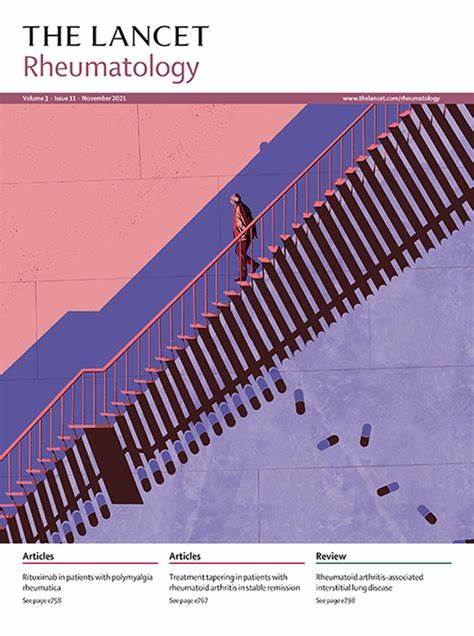Occupational therapist-led versus rheumatologist-led care in people with hand osteoarthritis in Norway: an open-label, multicentre, randomised controlled, non-inferiority trial
IF 16.4
1区 医学
Q1 RHEUMATOLOGY
引用次数: 0
Abstract
Background
Hand osteoarthritis is a common musculoskeletal disease with a rising prevalence due to increased life expectancy. Because the disease is diagnosed on the basis of clinical examination and the first choice of treatment is non-pharmacological, it is not a high-risk condition. We aimed to assess the non-inferiority and cost-effectiveness of occupational therapist-led care for hand osteoarthritis compared with rheumatologist-led care.
Methods
We did an open-label, multicentre, randomised controlled, non-inferiority trial at two hospitals in Norway. Participants with hand osteoarthritis aged 18 years or older were randomly assigned 1:1, stratified by centre, using a computed-generated randomisation list, to receive either standard rheumatologist-led care or occupational therapist-led care. The primary outcome was response to treatment at 6 months according to the OMERACT–OARSI criteria. Non-inferiority was tested in the intention-to-treat population using a response rate difference of 15% as a non-inferiority margin. A cost-utility analysis from the Norwegian health-care system perspective was done to assess the economic effect of occupational therapist-led care. Two patient research partners with first-hand experience of hand osteoarthritis were included in the project team from the outset and contributed to study design, development of research questions, and strategies for optimising the recruitment process. This trial was preregistered with ClinicalTrials.gov (NCT03102788) and is closed for recruitment.
Findings
Between Sept 19, 2017, and Nov 11, 2020, 374 patients were randomly assigned; 186 to rheumatologist-led care and 188 to occupational therapist-led care. Mean age was 63·6 year (SD 10·0), 302 (80·7%) of 374 participants were women and 72 (19·3%) were men. At 6 months, 48 (28·4%) of 169 participants in the rheumatologist-led group and 48 (28·6%) of 168 participants in the occupational therapist-led group were responders according to the OMERACT–OARSI criteria. Occupational therapist-led care was non-inferior to rheumatologist-led care (OR 1·01, 95% CI 0·63–1·62). Economic analysis showed that occupational therapist-led care was cost-effective up to a willingness to pay per quality-adjusted life-year of £23 255. No severe adverse events were recorded.
Interpretation
Occupational therapist-led care for hand osteoarthritis is non-inferior to rheumatologist-led care in terms of efficacy and safety. The economic evaluation indicates that occupational therapist-led care could offer a cost-saving approach with similar health outcomes, supporting the feasibility of task shifting to allied health professionals in the management of chronic conditions such as hand osteoarthritis. This approach aligns with global health-care recommendations to optimise resource use without compromising care quality.
Funding
The Norwegian Research Council, the Norwegian Rheumatism Association.
挪威手骨关节炎患者的职业治疗师主导与风湿病学家主导的护理:一项开放标签、多中心、随机对照、非劣效性试验
背景:手骨关节炎是一种常见的肌肉骨骼疾病,由于预期寿命的增加,患病率不断上升。由于该病是在临床检查的基础上诊断的,而且首选的治疗方法是非药物性的,因此不是高危病症。我们的目的是评估职业治疗师主导的手骨关节炎护理与风湿病学家主导的护理的非劣效性和成本效益。方法:我们在挪威的两家医院进行了一项开放标签、多中心、随机对照、非劣效性试验。年龄在18岁或以上的手骨关节炎患者被随机分配为1:1,按中心分层,使用计算机生成的随机列表,接受标准风湿病学家领导的护理或职业治疗师领导的护理。根据OMERACT-OARSI标准,主要结局是6个月时对治疗的反应。在意向治疗人群中使用15%的反应率差异作为非劣效性裕度进行非劣效性检验。从挪威卫生保健系统的角度进行了成本效用分析,以评估职业治疗师主导的护理的经济效果。两名具有手骨关节炎第一手经验的患者研究伙伴从一开始就被纳入项目团队,并为研究设计、研究问题的发展和优化招募过程的策略做出了贡献。该试验已在ClinicalTrials.gov (NCT03102788)进行预注册,现已停止招募。研究结果:2017年9月19日至2020年11月11日期间,374名患者被随机分配;有186人接受风湿病学家领导的护理,188人接受职业治疗师领导的护理。平均年龄为66.3岁(SD 10.0), 374名参与者中女性302人(81.7%),男性72人(19.3%)。6个月时,根据OMERACT-OARSI标准,风湿病学家领导组169名参与者中有48名(28.4%)和职业治疗师领导组168名参与者中有48名(28.6%)有反应。职业治疗师主导的护理不逊于风湿病学家主导的护理(OR 1.01, 95% CI 0.63 - 0.62)。经济分析表明,职业治疗师领导的护理具有成本效益,直至每个质量调整生命年的支付意愿为23255英镑。无严重不良事件记录。解释:在疗效和安全性方面,职业治疗师领导的手骨关节炎护理不逊于风湿病学家领导的护理。经济评估表明,职业治疗师主导的护理可以提供一种具有类似健康结果的节省成本的方法,支持将任务转移到联合卫生专业人员管理慢性疾病(如手骨关节炎)的可行性。这一做法符合全球卫生保健建议,即在不影响护理质量的情况下优化资源利用。资助:挪威研究委员会,挪威风湿病协会。
本文章由计算机程序翻译,如有差异,请以英文原文为准。
求助全文
约1分钟内获得全文
求助全文
来源期刊

Lancet Rheumatology
RHEUMATOLOGY-
CiteScore
34.70
自引率
3.10%
发文量
279
期刊介绍:
The Lancet Rheumatology, an independent journal, is dedicated to publishing content relevant to rheumatology specialists worldwide. It focuses on studies that advance clinical practice, challenge existing norms, and advocate for changes in health policy. The journal covers clinical research, particularly clinical trials, expert reviews, and thought-provoking commentary on the diagnosis, classification, management, and prevention of rheumatic diseases, including arthritis, musculoskeletal disorders, connective tissue diseases, and immune system disorders. Additionally, it publishes high-quality translational studies supported by robust clinical data, prioritizing those that identify potential new therapeutic targets, advance precision medicine efforts, or directly contribute to future clinical trials.
With its strong clinical orientation, The Lancet Rheumatology serves as an independent voice for the rheumatology community, advocating strongly for the enhancement of patients' lives affected by rheumatic diseases worldwide.
 求助内容:
求助内容: 应助结果提醒方式:
应助结果提醒方式:


